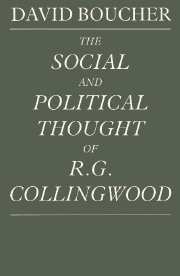Book contents
- Frontmatter
- Contents
- Preface
- 1 Collingwood in context
- 2 The New Leviathan in context
- 3 The two Leviathans and the criteria of rational action
- 4 The development of the European mind
- 5 Collingwood's liberal politics
- 6 The state and the body politic
- 7 The process of civilization
- 8 Conclusion: civilization and its enemies
- Notes
- Index
7 - The process of civilization
Published online by Cambridge University Press: 05 June 2012
- Frontmatter
- Contents
- Preface
- 1 Collingwood in context
- 2 The New Leviathan in context
- 3 The two Leviathans and the criteria of rational action
- 4 The development of the European mind
- 5 Collingwood's liberal politics
- 6 The state and the body politic
- 7 The process of civilization
- 8 Conclusion: civilization and its enemies
- Notes
- Index
Summary
Introduction
The discussions of civilization and barbarism in The New Leviathan constitute the meeting places of all that Collingwood had to say about mind, society, and politics. Freedom of the will, that is, the highest stage of mental development, is a prerequisite of civilization. Freedom of the will, as we saw, necessarily entails mutual recognition and respect for other wills. Such recognition and respect have profound implications for conduct inter homines and for the existence of a civil life in which civility stands as the ideal of human conduct. Civilization, for Collingwood, is not a condition, nor an ideal, of society: It is the process of converting the nonsocial into the social community. In other words, civilization is the process of education which the social element in the body politic, and the parents or guardians in the family, promote in order to assist the mentally and socially immature members to attain their full potential. The process of civilization is conditional upon the exercise of free will and the achievement of a social life. Similarly, barbarism is the revolt against the conversion process. It is the attempt to retard or reverse the process of civilization and reduce the body politic to a nonsocial community. The ideal of civility, to which the process of civilization aims to achieve an approximation, presupposes a dialectical relationship among the members of a body politic, whereas the condition which barbarism realises presupposes and engenders an eristical relation.
- Type
- Chapter
- Information
- The Social and Political Thought of R. G. Collingwood , pp. 195 - 220Publisher: Cambridge University PressPrint publication year: 1989



